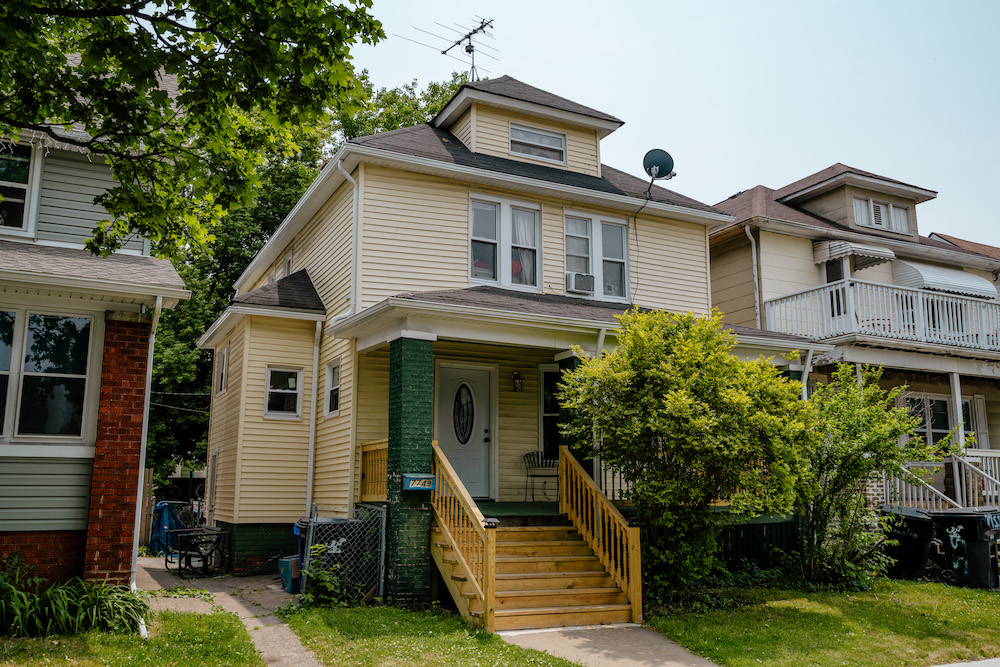
LeadSafe Detroit helps protect kids from lead poisoning
In the heart of southwest Detroit, Marlen Pena braved a fixer-upper. But when paint dust likely led to her daughter’s lead poisoning, she turned to LeadSafe Detroit for a lifeline.
The physical quality of housing is a crucial social determinant of health. An estimated 14% of households in Detroit live in inadequate housing, defined by University of Michigan researchers as “housing with major issues with exposed wires or electrical problems, broken furnace or heating problems, or lack of hot or running water.”
Children are particularly impacted – nearly 20% of Detroit children live in inadequate housing conditions.
38,000 Detroit households live in inadequate housing — 1 in 7 households.
In Detroit, four out of every five homes have been standing for 60 years or more. With 35% of Detroit residents living under the poverty threshold and a median household income of $34,762 in 2021, Detroiters have few resources to repair aging homes.
One significant threat impacting virtually all of these homes is lead paint. Congress banned lead paint in residential settings in 1978, but since most homes in the city are older than that, paint dust and chips containing lead poison residents every year. In Detroit, 9.4% of tested children had an elevated blood lead level defined at 3.5 micrograms per deciliter. Statewide, 3.7% of tested Michigan children had elevated levels.
This is a particular problem for children because lead can damage their developing neurological systems and cause lifelong cognitive and behavioral problems. There is no safe level of lead exposure.
Source: Michigan EJ Screen

Lead exposure: Lead from paint, pipes, and faucets can cause irreversible damage, especially in children, affecting the nervous system and cognitive development.
Temperature extremes: An absence of functioning heating and cooling systems can lead to health issues such as high blood pressure, respiratory problems, and even depression.
Mold-related issues: Water leaks promote mold growth, elevating the risk of respiratory ailments, asthma, and coughing.
Fire hazards: Faulty wiring increases the risk of a fire. The absence of smoke alarms, carbon monoxide detectors, and fire suppression measures can result in injuries or fatalities.
Overcrowding: Overpopulated homes can lead to mental health challenges, food insecurity, and a heightened risk of infectious diseases.
Energy burden: Poorly insulated homes and energy-inefficient homes cost more to heat and cool, placing a higher energy burden — the proportion of household income spent on energy — which leaves less money for other factors necessary for good health, such as food.
Source: Quality of Housing – Healthy People 2030 | U.S. Department of Health & Human Services
According to a 2021 University of Michigan survey, inadequate housing conditions disproportionately impact Black and Latino Detroiters. More of the city’s households with kids live in inadequate housing than those without, and renters are more likely than homeowners to live in poor housing conditions than homeowners.

Countless homes urgently require repairs. A 2021 study by the University of Michigan’s Poverty Solutions estimated a $2 billion expense to upgrade all homes in the metropolitan area to meet healthy standards.
Several programs are available to help Detroiters upgrade their homes. Here are a few:
Detroit 0% Interest Home Repair Loans Program
This city-run program offers residents loans with no interest for home repairs.
Weatherization Assistance Program:
Funded by federal grants and operated by the Wayne Metropolitan Community Action Agency, this program offers weatherization to reduce energy costs for low-income families.
Renew Detroit
This city program uses federal grant funds to assist seniors and disabled residents in Detroit with home repairs.
Detroit LeadSafe Housing:
This city program utilizes federal grant funds to help reduce lead exposure in targeted high-risk zip codes.

In the heart of southwest Detroit, Marlen Pena braved a fixer-upper. But when paint dust likely led to her daughter’s lead poisoning, she turned to LeadSafe Detroit for a lifeline.

The Gordie Howe Bridge is reshaping Delray with its significant presence and increased truck traffic. A city program funded by a community benefits agreement assists residents in adjusting or relocating.
